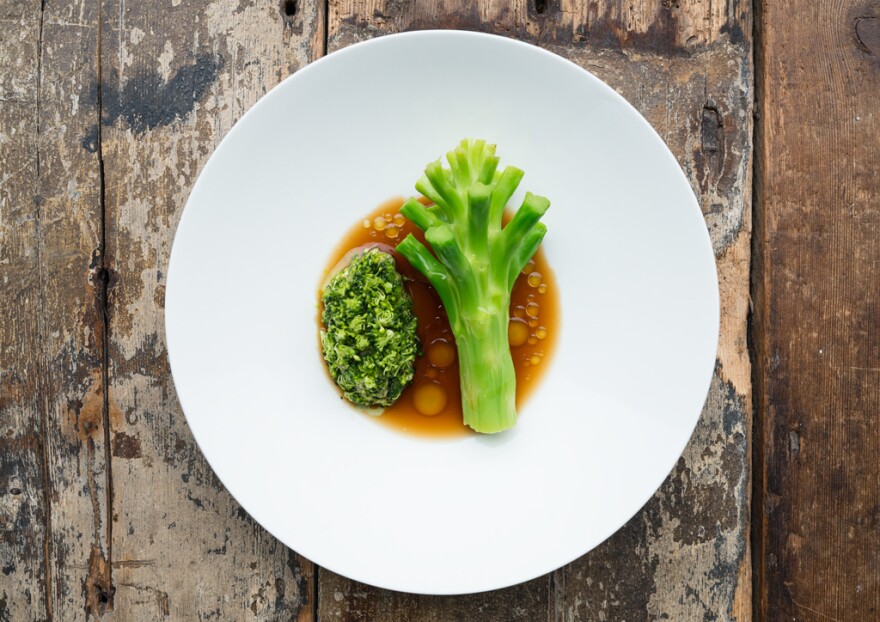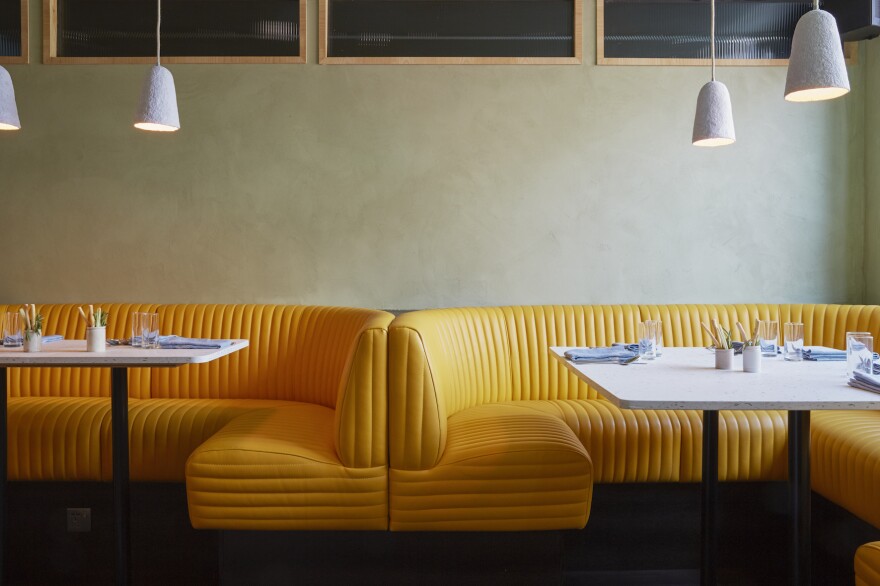Chef Douglas McMaster's flagship restaurant, Silo, takes that "industrial chic" aesthetic that dominates the modern dining scene to a whole new level. Located an hour south of London, in Brighton, England, the restaurant inhabits a 180-year-old building that has been styled into something like a barn — or a grain silo. Let's call it preindustrial chic.
After all, McMaster has said that isn't a restaurant so much as it is a "a preindustrial food system that generates zero waste."
Zero waste has become a sort of buzzword in the foodie world recently. From San Francisco to New York, London to Amsterdam, restaurateurs are challenging themselves to reduce the staggering amount of food waste that the industry generates (an estimated 571,000 tons annually by U.S. restaurants alone) and the amount of other resources they use — including electricity and water. From rejecting plastic straws to making byproducts like whey the star of a meal — restaurants are approaching that challenge in different ways.
Thirty-year-old McMaster has been at the helm of the movement — he opened Silo in 2014. And he's the first to say that it's nearly impossible to run a viable business that never generates any waste.
"Zero waste" is the ideal. But ... he's not going to deny his customers toilet paper.
"Really, it's about everything being natural and everything either going back into the system or going back into nature," McMaster says — or at least, it's about trying his very best to live up to that ideal.
Take, for example, the full English breakfast at Silo, which comes with all the classic components: toast, baked beans and mushrooms, topped with an egg and bacon. But the sourdough toast is baked in-house, from flour that's milled on site (so there's no fuel wasted in transporting it). The mushrooms are cultivated on site as well, in discarded coffee grounds. And everything else comes from mostly local growers — delivered sans packaging. It's all served up on a plate made from recycled plastic bags, for customers to enjoy while seated on stools made from recycled wood pulp. Anything that isn't eaten ends up inside "Bertha," which is what McMaster calls the industrial composter prominently displayed in Silo's lobby.

Silo does generate some waste.
"The big thing is wine — it would be ideal if we could get wine locally on tap," McMaster says. "The problem is we don't have the right latitude to be growing wine, whereas they do in Italy and Spain and France."
And he does feel guilty about all the empty wine bottles he's left with at the end of each day. He can recycle the glass, but he'd rather not create any waste in the first place. McMaster is also hoping that local artists can come up with a way to repurpose the glass bottles as artwork. "It is a compromise on zero waste," he says. "But sometimes you have got to be realistic, and you've got to be commercial."
His newest venture, Cub — a fine dining restaurant in London that opened this month — serves bottles of high-end champagne. But it eliminates waste in other ways.
The goal is to create a delicious, luxurious experience for customers without creating unnecessary waste. At Cub, they're looking at the composter as a last resort, says , the zero-waste mastermind behind a couple of award-winning London bars and McMaster's collaborator for this latest venture. "The idea is just reducing what we have coming in," Chetiyawardana says. "So there's nothing left over."
The menu features food and drink that elevate ingredients most people might consider byproducts, or off-cuts. For example: "Compost Smoked Carrot, Buffalo Curds and Whey."
Other dishes feature herbs and produce that are grown on site, with input from MIT flavor scientist Arielle Johnson. This includes two types of hydroponically raised radish seedlings — with completely different flavor profiles that come from manipulating the nutrients and stressors absorbed during cultivation. So you're basically getting two different flavors out of one, sustainably produced ingredient, Chetiyawardana explains.
His other operations have used slightly different eco-tactics. "When I first started bartending, everybody thought that to make a cocktail, the default was you'd take two parts of spirit, and one part of citrus and one part sweetener," Chetiyawardana says. The problem was, "with fresh fruit, you squeeze the juice out of it, you might use the zest and you throw the rest away," he says. "So I started to explore other options."

Instead of using fresh citrus for kick, at his first cocktail bar, White Lyan (which he closed this spring), Chetiyawardana experimented with vinegars and powdered acids. To avoid wasting water, he eschewed ice. Instead, each concoction was perfectly proportioned and pre-chilled. And to avoid creating waste packaging and burning away gasoline, he made his own spirits, tinctures and cordials in-house.
"Of course, that was a very dramatic approach," Chetiyawardana says. "But I don't think 'zero waste' has to be all or nothing."
That's the attitude of Claire Sprouse and Chad Arnholt, who run the New York-based , a sustainability consulting firm for bars that has worked with venues all over the U.S."There are so many things we do in the industry that are wasteful," Sprouse says. "So it's really about chipping away at the things."
Adds Arnholt, "This point cannot be overstated: Bars are a luxury business. At the end of the day, it is inherently wasteful because it's not fundamentally necessary."
Sprouse, who currently runs the bar , says: "The chef and I work very closely together to use each others' byproducts." When the chef decides to make corn on the cob, for example, Sprouse uses the woody kernels at the ends to make a cream that's reminiscent of coconut milk. "And I actually use that instead of coconut cream in cocktails," she says. The corncobs and corn silk are turned into stocks or tea. "So we're getting to experiment and play," she says.
That's the fun bit. The frustrating bit? "There's a multitude of other infrastructure and legislative barriers along the way," Arnholt says. Whereas Chetiyawardana was allowed to make his own spirits in the U.K., American bars and restaurants can't easily do so due to legal barriers. "And buying bulk spirits is flatly illegal in the U.S.," Arnholt notes. "You're not allowed to buy a spirit from a supplier that doesn't come in a single use container."
There are always limits, agrees Josh Fontaine — one of the founders of the Quixotic restaurant group in Paris. The group's latest restaurant, Les Grands Verres, which opened this July, sources locally whenever possible (to save fuel), aims to reduce food waste in the first place, and turns any leftover bits into natural gas.
"There are certain health rules that are imposed on us, so we have to use plastic wrap," Fontaine says. "And then there's things like — how do you order mop handles without them being in a box? How do you order your plates without boxes?"
"So I guess in that sense, we are far from zero waste," he adds. "But we're doing the best we can."
Copyright 2021 NPR. To see more, visit https://www.npr.org. 9(MDA5NTM4MTIyMDE0MTg3NDc2MTVlZjdmNQ001))





